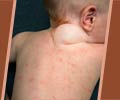Glossary
Mosaic: An individual with two cell types or more, comprising of different chromosome number or structure.Genetic Counselling: A communicative procedure that undertakes to deal with the problems that rise in a family with the occurrence or the risk of occurrence of a genetic abnormality.
Pedigree: A pedigree involves recording a family's history and making use of a standard set of symbols to represent the status of each member of the family.
Allele: An allele is an alternative form of a gene loated on a given locus of a chromosome.
Gene: Genes are located on the chromosomes and carry the information representing a protein.
Chromosomes: Chromosomes are structures made up of DNA and proteins found in the cells of all organisms.The number of chromosomes is species- specific.In humans it is 46.
DNA: The DNA is the basic unit of heredity and is known as the blue print of life. It carries the genetic code which stores the necessary information for all organisms.
Genotype: Genotype indicates the genetic constitution of an organism.
Phenotype: Phenotype refers to the physical appearance of an organism which is controlled by the genotype and the enviornment.
Haploid Cell: A cell having only one set of chromosomes,ie.23 pairs in humans.
Diploid Cell: Having two sets of chromosomes (46) in humans.
Hybrid: An offspring of parents belonging to two different species,example mule which is the offspring of a horse and donkey.
Mutation: An inheritable change in the gene or the chromosome.
Wild Type: An organism having a normal phenotype.
Mutant: An organism harboring a mutation.
Trisomy: A condition, which arises due to the presence of an extra chromosome.An example is Down syndrome, where the individual has an extra chromosome 21.
Mitosis: A division by which the cells reproduce, wherein the resultant cells are the replica of the parent cell.
Meiosis: A special kind of cell division,called reduction division, that takes place in the testes and the ovaries, which produces eggs and sperms that are haploid.
Consanguinous marriage: A marriage between two closely related individuals.
Euploidy: When an organism has the regular chromosome number,example 46 chromosomes in humans, it is euploid.
Aneuploidy: When an organism has an abnormal number of chromosomes as in Down Syndrome,it is known as aneuploidy.














